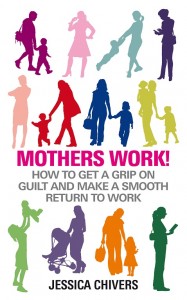 Author of Mothers Work! (Hay House, 2011) and founder of the Talent Keeper Specialists (www.talentkeepers.co.uk), Jessica Chivers shares the science of imposter syndrome and four practical ways to step over it.
Author of Mothers Work! (Hay House, 2011) and founder of the Talent Keeper Specialists (www.talentkeepers.co.uk), Jessica Chivers shares the science of imposter syndrome and four practical ways to step over it.
The average senior professional woman experiences 19 episodes of imposter syndrome in the first two years following a promotion and 4.2 per year in a role she’s acclimatized to. A woman making her career comeback post maternity leave will experience a least a couple of episodes a day. Actually, I made that up but it sounds reassuring doesn’t it? Have you ever felt like an imposter? Believed you’re not really up to the role you’re in or the task that’s in front of you; that you’ve somehow bluffed your way so far or got lucky and then been wondering how you’ll cope when you’re exposed? No public admissions are needed from you but for what it’s worth I’ll hold my hand up to it.
If you’re curious to know some of my imposter stories, click here to listen online (a seven minute version of this post with the extra juicy bits).
Psychologists Shamala Kumar and Carolyn Jagacinski found in their research with male and female undergraduate students that women are significantly more likely than men to experience the phenomenon. What’s more – and this ties in with an interesting, if too long for the point she’s making, book by Carol Dweck called Mindset – the women in this study were more likely than men to believe that intelligence is a fixed attribute that doesn’t develop over time. Reading between the lines the link I make between these two findings is that women who experience imposter syndrome may be unfairly believing themselves inadequate for the jobs they are doing – or being asked to do – as 30, 40, 50-somethings because they use earlier reference points in their careers to judge whether they are fit for what they are doing now.
Whilst not quite the same thing I still catch myself at times playing dumb, asking naiive questions and baring too much of my thoughts and feelings as I did very early on in my career, and then wondering later why I behaved like that because it did me a disservice and portrayed me as something different and lesser to what I am now.
4 Ways to overcome the imposter phenomenon
1. Reference recent experiences when judging capability
When you have an ‘I’m not up to this’ type stirring look for evidence that demonstrates why you are up to it. Imagine you are your publicist and drum up examples of recent experiences and successes (which may be small) that relate to the task or job you’re facing. If you’re running your own business being your own PR machine may be familiar territory.
2. Remember your capabilities are continually growing
When someone asks you to be involved or deliver something at work they see both the you that ‘has done’ (your past achievements) and the woman that ‘can do (future potential based on past performance). It’s OK not to be polished and practised in everything on your job spec (even if you’ve been doing the role a good few years). If you’re seeking a new role bear this in mind – if you were the recruiter, can you imagine the mistake that hiring someone who ticks every box would be? If a candidate can do everything standing on their head in hotpants there’s clearly going to be no stretch and challenge. So be bold, seek out a role that has lots of things you can demonstrate you can do and plenty that you haven’t got the evidence base for yet.
3. Seek feedback on your capability
If you’re on LinkedIn you’ll no doubt be aware of the nifty widget that allows people in your network to endorse skills LinkedIn thinks you’re likely to posses. Looking at what other people see as your capabilities is an excellent way to challenge professional insecurities. Given it’s our fear of other people changing their minds about us that is at the heart of Imposter Syndrome, taking stock of those same people’s views on this platform can be tremendous smack in the face for self doubt. Beyond LinkedIn 360 degree feedback tools are a useful aid in the workplace.
4. Use yourself as your reference point
And finally, Kumar and Jagacinski’s work suggests both men and women who experience imposter syndrome are more likely to compare themselves to others. Benchmarking can be useful but not all the time. If you’ve delivered in the eyes of the people who matter in the roles you play in your life, you’ve delivered. It matters less if those deliveries or successes aren’t as grand, as quick or as easily gained as other people. The point is you can do it.
What’s the golden nugget to take away? People ask you to do things on the basis of your potential as well as your past performance. Where peers are more practised or polished than you it doesn’t mean you can’t deliver using the capability you have. And you probably have more capability than you think – seek and you will find.
 Jessica Chivers is the author, Mothers Work! How to Get a Grip on Guilt and Make a Smooth Return to Work (Hay House, 2011). “This is THE book employers should be giving all their women returners.” Professor Karen Pine.
Jessica Chivers is the author, Mothers Work! How to Get a Grip on Guilt and Make a Smooth Return to Work (Hay House, 2011). “This is THE book employers should be giving all their women returners.” Professor Karen Pine.
